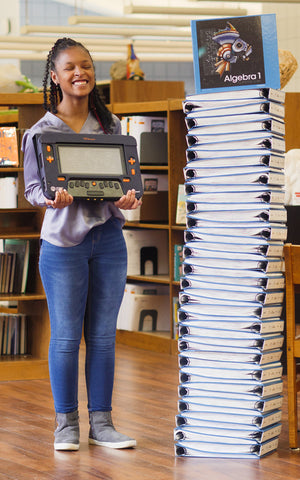Education
Maths and STEM
Recent advances in computer screen readers like JAWS and NVDA are now opening up possibilities for independent learning by blind students, even in areas of study that have been difficult to support in the past, such as advanced mathematics.
The Braille Math Editor allows students with Focus braille displays to edit and compose equations in UEB braille and insert them into WORD documents, as part of assignments, exams and homework. Teachers and parents can see their working out onscreen as regular visual equations and correct them in real time without having to send their work to a braille transcriber.
The JAWS Math Viewer and MathKicker.AI allow students without braille displays to work with web content, for example from Wikipedia.
MathPix is an online application that can convert graphics that include maths - even hand-written maths - into digital maths that can be read by JAWS.
DESMOS is a graphing scientific calculator application, which can be used with JAWS, and Focus braille displays. Not only can the student choose to work in braille within this calculator, but their working out is shown in normal print for the benefit of teachers and parents.
Peter Cracknell from Quantum RLV has presented extensively on STEM assistive technology and has written some support materials for using Braille Math Editor, which you can download here :
Dynamic Tactile options for braille learners and students

Monarch Dynamic Tactile Display

Dot Pad Dynamic Tactile Display from Dot Inc
Braille is key to literacy for students who are blind. Traditionally embossed on paper and delivered in large volumes to students, along with paper tactile diagrams, some exciting new digital technologies are emerging that promise to deliver content in digital format.
Mixing braille text and graphics, Dynamic Tactile Displays like the Monarch and the DotPad may deliver curriculum content on demand as digital files, rather than costly (and very heavy braille) volumes that may take weeks to produce.
Digital Displays offer quick search functions, zooming of graphics, dynamic display of data from lab equipment, animated diagrams, remote learning, and content creation by the blind student themselves. For example, a blind student could write equations in braille that are displayed in normal view for their maths teachers, or a braille musical composition could be displayed as music score.
Maps and graphs can be instantly displayed and inspected by touch. Zooming features allow an overview, panning, and detailed view. Current paper graphics are static and complex diagrams have to be split across many pages. On a Dynamic Tactile Display, they can instead be embedded in a single file and viewed in context, rather than as separate pages in another volume.
Dynamic Tactile Displays may one day vastly improve the educational opportunities for blind people, allowing them to study STEM subjects up to University level and pursue careers in a wider range of industries. Consider that even non-STEM subjects require graphs and statistics.
Aside from the enormous benefits to individual students, DTDs may offer significant time-saving and material-saving opportunities for alternative format production facilities.
Reading Difficulties
In Australia one in 10 individuals has a learning disability, with 80% of these having dyslexia.
Many people have difficulty reading at school, and this can continue to be a significant problem for them when seeking employment, in TAFE and further education, and of course in general life.
Reading difficulties are often associated with dyslexia, vision impairment, and learning disabilities. Many young people with ADHD and ASD also struggle to keep up with their peers at school and need extra support – either from teacher aides, SPELD specialist tutors or from text-to-speech devices such as C Pen and OrCam, which has been trialled successfully in several schools.
Quantum works with individuals, families, occupational therapists, speech therapists and relevant allied health professionals to find positive outcomes for anyone with a reading disability.
Feel free to contact us at anytime.
"When students are agents in their learning, that is, when they play an active role in deciding what and how they will learn, they tend to show greater motivation to learn and are more likely to define objectives for their learning. These students are also more likely to have 'learned how to learn' – an invaluable skill that they can and will use throughout their lives."
From OECD Future of Education and Skills 2030 Framework
Watch our short video Quantum's product and service offering to the Education sector below.
Education Ready Reckoner
https://www.quantumrlv.com.au/pages/education-ready-reckoner
Reading Anywhere - Beyond the Classroom
In this Talk-to-the-Experts webinar, Quantum’s Peter Cracknell interviews Mr Jeff Souter, Statewide Advisory Visiting Teacher, Assistive Technologies from the QLD Department of Education about how schools can support students with reading difficulty; particularly addressing assessment adjustments and technology that is approved for use in the classroom.
Jeff also presents findings from the Department of Education’s successful trial of the OrCam in 9 schools across QLD. We also hear from SPELD QLD, who support struggling students directly in the classroom and with extra-curricular engagement. Finally we see video clips of young people using portable reading devices like the OrCam READ - at TAFE, in the community, and at home.
Watch the interview with Jeff Souter
View the results of the QLD Education Department OrCam trial.
Workshops
A Quantum Education Initiative: Quantum runs technology workshops on assistive technology solutions for participants from primary, secondary and tertiary education, rehabilitation and employment settings. Workshops are available for all products at our offices or at external training facilities, depending on your preference. Read more.
